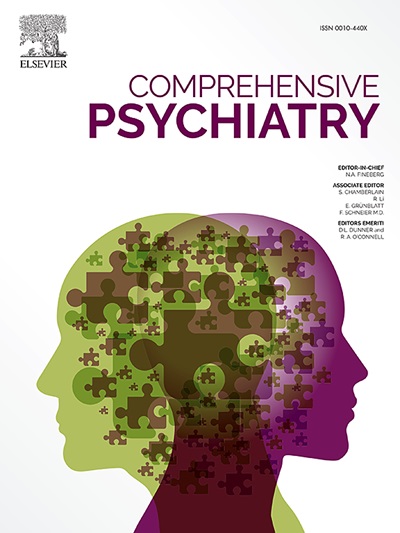The relationship between cognitive and affective control and symptoms of depression and anxiety across the lifespan: A 3-wave longitudinal study
IF 4.2
2区 医学
Q1 PSYCHIATRY
引用次数: 0
Abstract
Introduction
The association between cognitive functioning and mental health symptoms across the lifespan remains poorly understood. Understanding the directionality of the association between mental health and cognition is important as most gold-standard psychological therapies, such as cognitive-behaviour therapy, are cognitively demanding. Here, we examined the directionality of the association between cognitive and affective control with symptoms of depression and anxiety across the lifespan.
Methods
1002 participants (87.2 % female, age range: 11–89 years) completed self-report measures of depressive and anxiety symptoms and an affective backward digit span task thrice at 3-month intervals. Cross-lagged panel models (CLPMs) were used to model the longitudinal relationships between affective and cognitive control with depressive and anxiety symptoms. Multiple-group CLPMs were applied to test the model invariance between adolescents and adults.
Results
The results supported a unidirectional relationship, where symptoms of depression and anxiety predicted impaired affective control across time points, over and above cognitive control. There was no evidence for affective or cognitive control capacity predicting emotional disorder symptomatology. In addition, multiple-group analysis revealed that depressive symptoms also predicted impaired cognitive control among adolescents only. There were no age-related differences in the associations between cognitive and affective control with anxiety symptoms.
Conclusions
Our findings support depression and anxiety as antecedents, but not consequences, of impaired affective control. This suggests that timely management of emotional disorders, in particular for adolescents, is essential to prevent deterioration in cognitive functioning. The results further signal that practitioners should consider impaired affective control capacity in therapeutic contexts.
认知和情感控制与抑郁和焦虑症状之间的关系:一项三波纵向研究。
在整个生命周期中,认知功能和心理健康症状之间的关系仍然知之甚少。了解心理健康和认知之间联系的方向性是很重要的,因为大多数黄金标准的心理治疗,如认知行为治疗,都是认知要求。在这里,我们研究了认知和情感控制与抑郁和焦虑症状之间的联系的方向性。方法:1002名参与者(87.2%为女性,年龄范围:11-89岁)每隔3个月完成3次抑郁和焦虑症状的自我报告测量和情感向后手指跨度任务。交叉滞后面板模型(clpm)用于模拟情感和认知控制与抑郁和焦虑症状之间的纵向关系。采用多组clpm检验青少年和成人之间的模型不变性。结果:结果支持一种单向关系,抑郁和焦虑的症状预测跨时间点的情感控制受损,超过认知控制。没有证据表明情感或认知控制能力可以预测情绪障碍的症状。此外,多组分析显示,抑郁症状也预示着青少年的认知控制受损。认知和情感控制与焦虑症状之间的关联没有年龄相关的差异。结论:我们的研究结果支持抑郁和焦虑是情感控制受损的前提,而不是后果。这表明,及时管理情绪障碍,特别是对青少年来说,对于防止认知功能恶化至关重要。结果进一步表明,从业者应该考虑在治疗环境受损的情感控制能力。
本文章由计算机程序翻译,如有差异,请以英文原文为准。
求助全文
约1分钟内获得全文
求助全文
来源期刊

Comprehensive psychiatry
医学-精神病学
CiteScore
12.50
自引率
1.40%
发文量
64
审稿时长
29 days
期刊介绍:
"Comprehensive Psychiatry" is an open access, peer-reviewed journal dedicated to the field of psychiatry and mental health. Its primary mission is to share the latest advancements in knowledge to enhance patient care and deepen the understanding of mental illnesses. The journal is supported by a diverse team of international editors and peer reviewers, ensuring the publication of high-quality research with a strong focus on clinical relevance and the implications for psychopathology.
"Comprehensive Psychiatry" encourages authors to present their research in an accessible manner, facilitating engagement with clinicians, policymakers, and the broader public. By embracing an open access policy, the journal aims to maximize the global impact of its content, making it readily available to a wide audience and fostering scientific collaboration and public awareness beyond the traditional academic community. This approach is designed to promote a more inclusive and informed dialogue on mental health, contributing to the overall progress in the field.
 求助内容:
求助内容: 应助结果提醒方式:
应助结果提醒方式:


